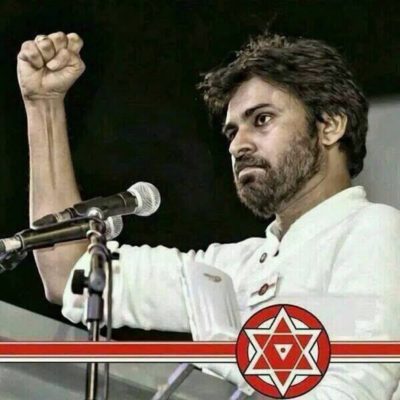
To Redefine Idealism In The Modern Day Turmoil
As of publishing this article, the four-year-old party ‘Jana Sena Party’ as envisioned and established by one of Andhra Pradesh’s most iconic stars, Pawan Kalyan, walks alone into the political arena. By snapping ties with the state ruling party Telugu Desam Party (TDP) and the national ruling party Bharatiya Janata Party (BJP), quite so dramatically over the past couple of months, Jana Sena Party would look to the 2019 assembly elections to establish itself as a desirous alternative to the voters from the region, who presently seem to have been split for choices. Political analysts notice that there couldn’t have been a better time than this year, for Pawan Kalyan to step up the pedal, and truly establish himself as a beacon of change, with the residual state of Andhra Pradesh.
When we say the residual state, it is not a mere irony that post the bifurcation of Telugu speaking states Andhra Pradesh has looked to its new brother state, Telangana, with an air of envy. After all, even a casual observer of the political scene within the two states would vouch for one thing very clearly. Telangana has prospered both socio-politically and economically since its formation on 2nd of June, 2014. Make no mistake that rebuilding and reconstruction of Andhra Pradesh, which had lost out on major Industrial and Services revenue albeit the plethora of Tech giants established within the city of Hyderabad, was always going to be a herculean task.
It would seem that the elected party of TDP realized the audacity of such wishful thinking, much late into the game. And before the projects could swiftly be put into the plan, and the funds streamlined to make sense, TDP now has another election coming up sooner than ever. Juggling between the political turmoil that is slowly turning into an uncontrollable chaos, and facing the accountability calls of its political tenure, TDP finds itself in a bit of a pickle, as its leader, the seasoned veteran of a politician, Mr Chandrababu Naidu, rolls up his sleeves to fight it out with his competitors, both within and without.
Mr Naidu today faces usurping forces around him, in the form of three younger men who haven’t had their taste of political success. Pawan Kalyan (JSN), Y.S. Jagan Mohan Reddy (YSRC) and in a weird twist of fate, his own son, Cabinet Minister for IT, Panchayati Raj and Rural Development, Nara Lokesh.
In defining Nara Lokesh as a potential usurper for Mr Naidu, one has to understand that he seldom showcases his promise to take over the mantle from his father, and being so, the reluctant protégé, Nara Lokesh poses as much a threat to the ruling party as Pawan Kalyan or Jagan Mohan would at this point.
Of this trio, arguably it is Pawan Kalyan who, although being a late entrant into the political scenario, today poses an undeniable influence on the fortune and laments of Andhra Pradesh politics in the coming months. Pawan Kalyan, not just brings to the table a set of new communal thoughts but is also in the process of establishing a paradigm of conscience-driven change. In doing so, perhaps the 46-year-old superstar, in many ways may well become the ‘conscience keeper’, so desperately needed by the elder Telugu state.
Origins Of ‘The Pawan Factor’
Pawan Kalyan, as he steps into this election season, has left no qualms to establish the fact that his area of operations would invariably be the coastal regions of Andhra Pradesh. It comes as a logical derivation given the fact that Pawan Kalyan’s outfit Jana Sena Party enjoys strong communal connect in the region, starting from the dual Godavari districts to the upper tip of Srikakulam. He has also decided to enrol himself as a voter out of the Eluru electoral. It is also a worthy observation that Jana Sena would be carrying forward the communal legacy of the now defunct Praja Rajyam Party, started by his brother, Mr Chiranjeevi. Praja Rajyam Party, today serves as a representative progenitor to Jana Sena Party, and Pawan Kalyan would be definitive about the success the previous party met in this region. It needs to be added here that although Jana Sena Party comes as more of a replacement for Praja Rajyam, it is led by two very different leaders, believing and fighting for very different concerns.
Another factor that would’ve prompted Pawan Kalyan’s political agenda to stem out from coastal regions would be the fact that YS Jagan prides a strong foothold in the Rayalaseema region of the state. Make no mistake, Jagan led YSRC has its bases deeply rooted within these regions, for the past decade or so.
In openly lashing out on TDP (specifically Nara Lokesh) at the recent Party meeting, Pawan Kalyan has ensured that the situation of political polarization starts expanding, just in time for the new players to step into the game.
It is apparent from the emotionally driven speech that Pawan Kalyan is willfully distancing himself from the TDP-BJP coalition, which in many ways discounted his contribution in the last election. One could also argue that it was a strategic move from the Jana Sena party to prepare itself for the 2019 election than any before, owing to the tumultuous scenario of state bifurcation. Now that the dust has settled in, and TDP has found itself in a fix over promise fulfilment, agenda appreciations and more importantly, succession conundrums, Jana Sena party and YSRC have all the conducive reasons to take over the reins.
However, Pawan Kalyan is emerging to be a stronger contender. The more he grows in strength, the more it worries the coalition of TDP-BJP and YSRC as well. TDP would be looking back at its 2014 win with a feeble smile, realizing that it was perhaps ‘The Pawan Factor’ which helped them hit the home run.

After all, the vote share of TDP in that election individually was only 35 percent, whereas, one has to remember that YSRC individually had mustered a considerable lead, by standing at 45 percent. As fate would have it, TDP stood to gain from Congress’s 9 percent and BJP’s 3 percent, making the final figures turn in the favour of TDP, who triumphed over YSRC by a mere margin of 2 percent. When one looks to decode this difference, that is the 2 percent, it is clear that ‘The Pawan Factor’ swung the game at the crucial deciding moment. Pawan Kalyan, at that time, was merely taking tentative steps into the state polity and became a divisive force in a short time.
Today, things have changed drastically, and the superstar enters the arena with an assured proficiency.
The Role Of Conscience Keeper – For The Statehood Or An Ideology?
Having said that, Pawan Kalyan will turn out to be a definitive force in the elections, one has to remember the ideological sense that the detached star has to offer. Pawan Kalyan’s ideology, strongly reflective of communist precludes, stands as an opposing force to the already established veiled libertarian and pseudo-republic agendas. BJP, today, is hoarded by agitations of proletariat class of societal inequality and continual injustice. BJP, much like TDP within the state, faces more questions on their deliverance, than they can seemingly answer.
The effect, of course, has been clearly a sense of underwhelming servitude that prevails across the states. Pawan Kalyan’s communist ideologies, which speak of equalism and neutrality, might just be the golden words that the working class seeks to hear. However, one question looms large on the revved-up Jana Sena party and its founder. Can Pawan Kalyan deliver on not just the promise of a change in governing body, but also on its ideology of rule? Changing governments, after all, can be achieved with proper strategizing, but can a party truly change the core ideology of politics within a state? This pondering today, will become the core question upon which the future of Jana Sena party will depend on. Perhaps, It might be a question less to do with the movements of the party, than the solitude of its founder who maintains a rather detached philosophy of ‘Do your Job..and Disappear’.
At this point, Pawan Kalyan’s promises of establishing a utopian state start with the fight on the issue of ‘Special Status for Andhra Pradesh‘. Clearly, that’s an ace up against any non-yellow politico’s sleeve. BJP might’ve missed a trick, some would say quite voluntarily, in denying the special status severance package to the state of Andhra Pradesh. If one were to see, BJP’s strategy today seems to be ‘wait-and-watch’. They would be mushing their hands, to see the local parties fight and bleed over issues, and eventually for the winner to emerge.
The proactive ignorance towards the state also stems from the fact that BJP clearly stood nothing to benefit from the coalition back in 2014. It, therefore, becomes a classic case of ‘cut the limb, to stop the spread’. Of course, BJP would be more than happy to play the waiting game and extend its support to the winning party. Clearly, Andhra Pradesh is not a golden goose for the national ruling party.
This attitude, in a twisted sense of logic, actually works in the favour of Pawan Kalyan’s Jana Sena. BJP by validly not supporting anyone, and with TDP coming out to detest the BJP openly, the ruling party might be hoping to see the neo-idealistic governance take form under Jana Sena. However, the problem here is of the shade of BJP falling on Jana Sena.
It is clear that both these parties have a strong ideological difference, at least at this point in time. It would be counter-productive on the part of Jana Sena to join hands with BJP, who at this point is being touted as the ‘Saffron Diktat’. Equalism and communal plurality aren’t exactly the strong points of BJP, and would definitely clash with Pawan Kalyan’s ‘all for one, one for all’ attitude.
Victory Upon The Shoulders Of Society
The questions which need answering over the political season next are perhaps these – Can Pawan Kalyan pull of another NTR, by converting his communal identification and star power into an undeniable vote bank? Will the fate of Praja Rajyam, also started under similar foundations, be repeated after these many years? What difference does Pawan Kalyan offer, which can’t be coached up by other competitors? To answer these questions, one might’ve to wait till the 2019 elections. However, one can predict what could very well happen, as a subsequent eventuality, keeping in mind ‘The Pawan Factor’, as experienced till now.
In an interview on the sets of Sardar Gabbar Singh, Pawan Kalyan spoke about his political ambitions and endeavours. In talking so, he states that he is in the elections ‘Not for Power, and Not for Position’. What he is in for, is the establishment of idealism. Perhaps this is where, fundamentally, the legendary NTR with his TDP, and Pawan Kalyan with his Jana Sena, differ. NTR wanted a change but also wanted to be the one driving the change, with the bearing of the Chief Minister on his shoulders. Historians will say that this aggressive, and sometimes willfully eccentric stance of NTR established TDP and Andhra Pradesh as a dominating power in the nation’s politics. The change was there to be made, and the superstar owned it up. Whilst speaking on the topic, political commentator and philosopher Aristotle vouched for this sort of strategy. A leader is born out of action and command, rather than of reactionary purpose.

In this context, it has to be said that Pawan Kalyan, by a distancing himself from the politics of power, might’ve scored good points on an ideological basis, but may have softened the causal effects of people rallying behind him. Today, Pawan Kalyan is Jana Sena and vice-versa. There seems to be a momentous gap between Pawan Kalyan and the next in command, a position which still remains a blurry one. Now in such circumstances, Pawan Kalyan needs to usher into power consideration, perhaps redefine the moniker, ‘power’star, and lead from the front. Politics, in a democratic state of affairs, is seldom a one-man game. The ask of the day is for him to be a ‘hungry tiger than a wise whale’.
When people use the term ‘vote bank’ politics it is often meant by the press in a manner of disgust. However, when one keenly observes the scenario of politics and the establishment of democratic principles in a nation as vast as ours, ‘vote bank’ is the only way forward for political tenacity. After all, every act on this earth is directly or indirectly a political act. Now, having spoken of it, it is not a far-off assumption that the political scenario in the Telugu state is based on caste and creed. It’s the hard truth. Despite any idealism lurking across the corner, this is the situation.
TDP has been the reflective outfit for the Kamma community, so much as YSRC (and to some extent the YSR led Congress) has been for the Reddy community, predominantly. In this context, Pawan Kalyan’s Jana Sena, in spite of its neutral bearings, will be defined by the acts of Kapu community in the forthcoming elections.
Any debate on this would be futile. However, the concern is not where a party is getting its initial push from, but where does it go from there. The community identification will only help to get the proverbial horse to the pond. What happens next, will define the longevity of the party.
The Change Promised By Pawan Kalyan
Conscience is the collection of ideas intending for the collective good. Pawan Kalyan, when we say, might become the ‘conscience keeper’ of the state, we attribute much hope to the fact. Irrespective of the results of the elections, Pawan Kalyan’s Jana Sena may become a strong alternative available to the voters at any point in time in the future. With his brand of fiery idealism, Pawan Kalyan may well go on to construct something unique in the political space, a party devoid of categorization, preferential treatment, or agenda politics, as promised. It is, however, the sustainability factor of such strong integrity that instils scepticism in the most optimistic believers. Pawan Kalyan is in the fight for the CM’s position today as he might well be tomorrow, even if he doesn’t want to. He is in the race, and perhaps for the good. He intends to construct a base on the very grounds that his brother’s party lay bare. Of course today Pawan Kalyan doesn’t need to test the waters again. The knowledge from experience is there for his taking.
Today, he learns and leads a new outfit, gathering a snowballing momentum into the political competition. He faces TDP with its vast and efficient political wisdom and YSRC with its undeniable eccentricity and resources.
Pawan Kalyan finds himself in a comforting situation where there exist political disappointment and disruption in the state. Idealism may just be his biggest weapon.
Coupled with a community which vouches for its identity, or rather has been for decades already, ‘The Pawan Factor’ is in full play here. If only he maintains the idealistic attitude, all through his ranks and his acts, one may make a guess that perhaps the Telugu state may very well find its ‘Conscience Keeper’. However, to establish so, one needs to be in power. There are no two ways about it.
Like Rajnikanth warding off prevailing two powers, Pawan Kalyan too, has his task cut out for him. Choosing a dependable team, with extreme caution, is the need of the hour. After all, how the forthcoming elections will play out and who will emerge as the voter’s victor is anybody’s guess. But the fact that someone offers a viable change from the state of uncertainty is everybody’s prayer.
Will Pawan Kalyan truly become the ‘Conscience Keeper’ of Andhra Politics? Perhaps, only time will tell.














